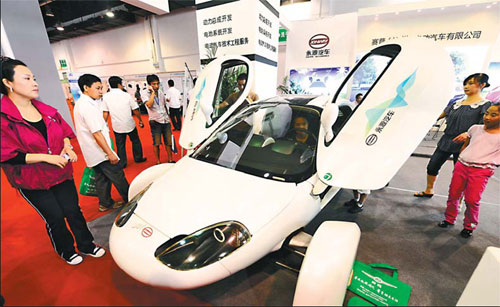Shanghai considers free license plates for green vehicles
|
Visitors examine an Aptera electric car developed by Zhejiang Jonway Automobile Co Ltd at the 2012 China International Green Vehicle Industry Expo in Hangzhou, Zhejiang province, on Aug 10. China expects production and sales of electric vehicles to reach 5 million by 2020. Li Zhong / For China Daily |
Shanghai authorities are considering giving free license plates to owners of energy-saving vehicles, in an effort to encourage the use of electric models, said the chief engineer of the country's largest domestic carmaker.
Ling Tianjun, chief engineer of Shanghai Automotive Industry Corporation, told China Daily that subsidies will be offered to buyers and tax rebates to companies, to help ease the expected high costs involved in buying the new generation of vehicles.
He added that he considered free plates a good incentive to encourage purchases of such vehicles, which are expected to gain a larger market share in the years to come.
Speaking on the sidelines of the Innovation Design Forum of Shanghai Design Biennial 2012, he also said that the industry is keen, too, for any financial assistance, given the huge investments involved in developing them.
"The research and development costs of new energy vehicles at this stage are very high, and the industry is thirsty for government support," said Ling.
Shanghai has been attempting to ease its traffic congestions by controlling the number of private cars on its roads. The authorities have been auctioning private license plates, but bidding prices have kept rising, as more people compete for the plates.
According to Shanghai Commodity International Auction Co, the average price of a private Shanghai license plate in July was 58,271 yuan ($9,140), up 44 yuan on the previous month.
SAIC has remained committed to developing clean-energy vehicles, including hybrid electric, pure electric and fuel-cell vehicles, said Ling.
The company has already said it will invest a further 6 billion yuan in the next five years to develop electric vehicles, on top of an earlier 2 billion yuan investment.
The company is targeting a 20 percent market share of the electric vehicles by 2015, said the SAIC chief engineer.
The company is pinning its hopes on two models, the Roewe 750 Hybrid, and the Roewe E50, added Ling.
The E50 is a supermini vehicle and is expected to be equipped with a 47 kw electric motor to cover a distance of 135 kilometers on one charge
The 750 is a saloon based on the design of the original Rover 75.
"SAIC will introduce its first pure electric car, the Roewe E50, this November and we expect 1,000 of them to be sold within a year," Ling added.
He said that the Roewe 750, running on a combination of batteries and conventional engines, will cost about 230,000 yuan, but with potential government subsidies, consumers in Shanghai could buy it for about 210,000 yuan, "a very attractive price".
China has been pushing the development of electric vehicles to cut emissions and conserve energy.
The nation expects production and sales of electrical vehicles to reach 500,000 units in 2015, and to five million by 2020.
In June, the Ministry of Finance said that the central government will allocate 1 to 2 billion yuan annually to support the development and production of greener vehicles.
Zhang Shaochun, deputy minister of finance, said the government will also promote the use of hybrid buses in large and medium-sized cities.
xieyu@chinadaily.com.cn



















